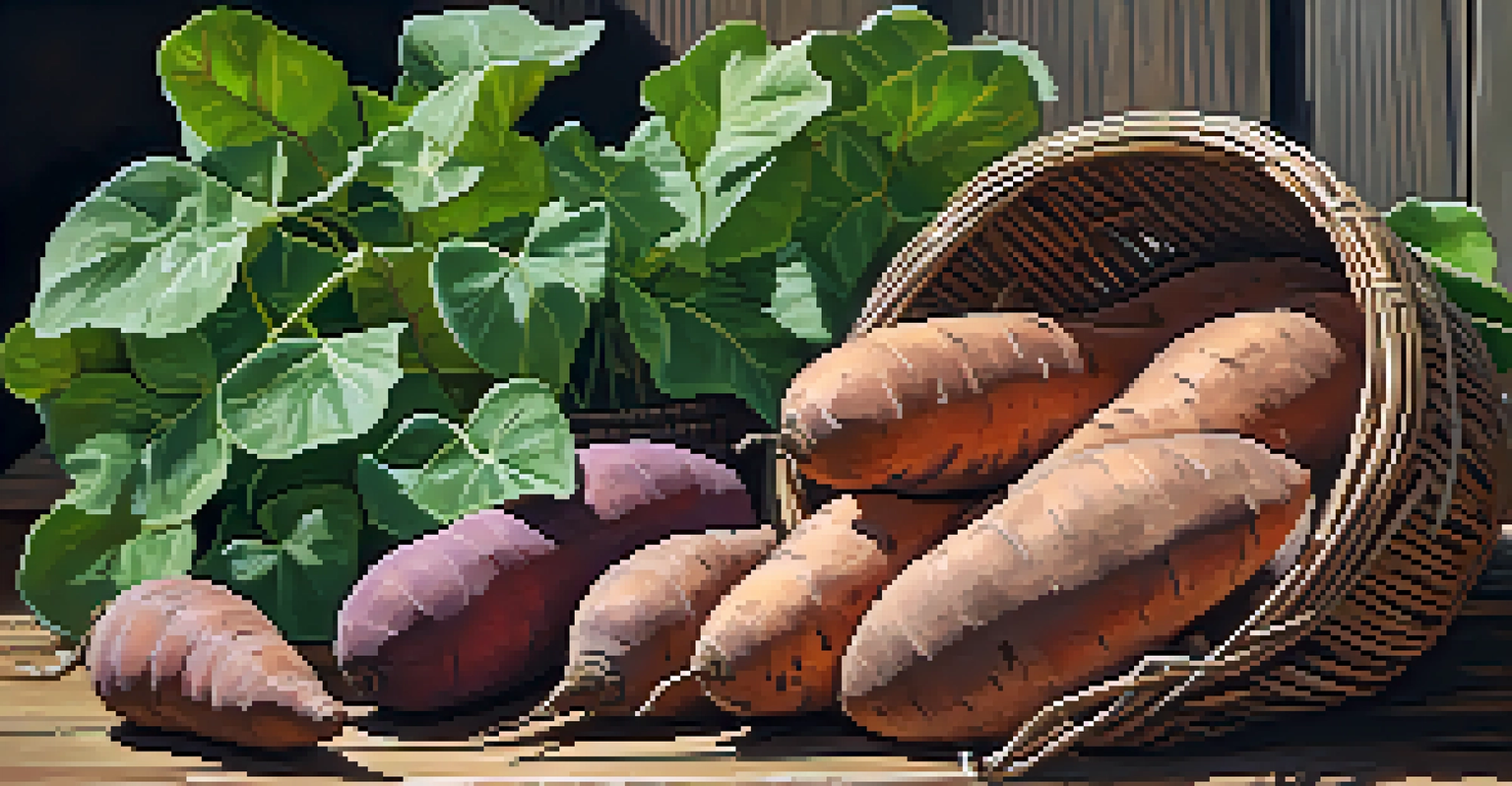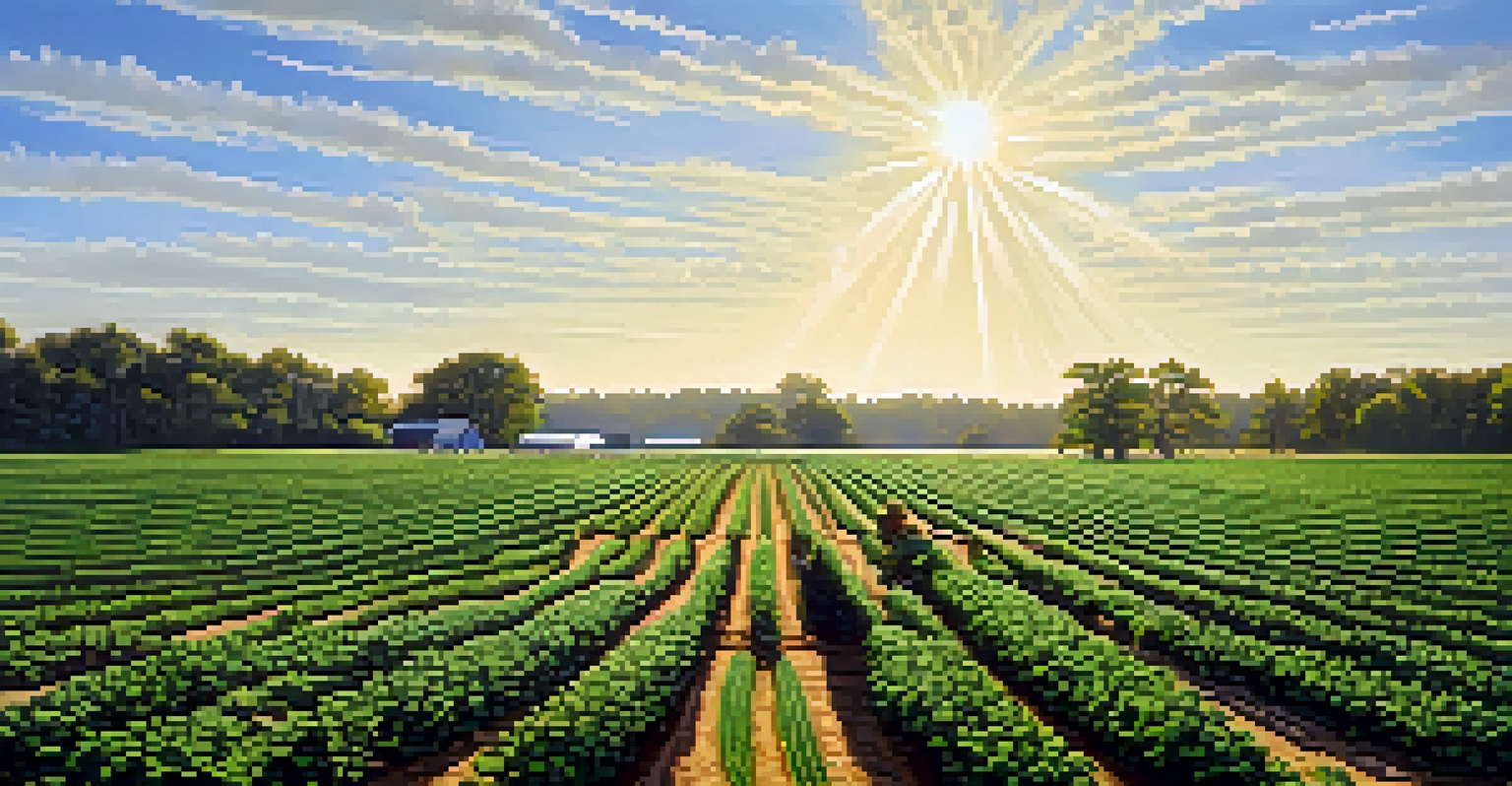Major Crops of North Carolina: A Comprehensive Overview

Introduction to North Carolina's Agricultural Landscape
North Carolina boasts a diverse agricultural landscape, making it a vital player in the nation’s farming scene. With its varied climate and fertile soil, the state is suited for cultivating a wide array of crops. The agricultural industry not only supports local economies but also contributes significantly to the state’s overall revenue.
Agriculture is the most healthful, most useful, and most noble employment of man.
From the mountains to the coast, North Carolina’s geography allows for the production of both traditional and specialty crops. Its rich history in farming has shaped the culture and economy, making agriculture a cornerstone of life for many residents. This overview will explore the major crops that define the state's agricultural identity.
Understanding these crops provides insight into the local economy, culinary traditions, and the livelihoods of countless farmers. As we delve deeper, you'll see how these crops reflect North Carolina's unique environment and agricultural practices.
Tobacco: The Historic Backbone of North Carolina Farming
Tobacco has long been the king of crops in North Carolina, known for its rich flavor and quality. Historically, the state has been one of the largest producers of tobacco in the country, with counties like Granville and Person leading the charge. It played a significant role in shaping the state's economy, culture, and even its social fabric.

While the tobacco industry has faced challenges in recent years due to health concerns and changing consumer preferences, it still remains an important crop for many farmers. The crop is not just about economic value; it also carries a deep cultural significance, with traditions and practices passed down through generations. This connection to the land and heritage maintains its importance within North Carolina's agricultural landscape.
Diverse Crops Shape NC's Economy
North Carolina's varied agricultural landscape includes key crops like tobacco, corn, and sweet potatoes, which significantly contribute to the local economy and culture.
Today, farmers are diversifying their production methods, focusing on sustainable practices and exploring value-added products. This evolution reflects the changing tides of the agricultural sector while honoring the crop's storied past.
Corn: A Versatile Staple Crop in North Carolina
Corn is another major crop in North Carolina, renowned for its versatility and widespread use. The state ranks among the top corn producers in the nation, with both field corn and sweet corn playing crucial roles. Corn is not only vital for human consumption but also serves as animal feed, making it essential for livestock farming.
The farmer has to be an optimist or he wouldn’t still be a farmer.
The climate and soil in North Carolina provide ideal conditions for growing corn, which thrives in the warm summers and well-drained soils. Farmers often rotate corn with other crops to maintain soil health and maximize yields. This practice not only improves the quality of the soil but also helps in pest management.
Additionally, corn's role in biofuel production has garnered attention in recent years, aligning with the state's goals for renewable energy sources. As we look toward the future, corn will continue to be a pivotal crop, supporting both the agricultural economy and sustainable practices.
Soybeans: A Rising Star in North Carolina Agriculture
Soybeans have emerged as a significant crop in North Carolina, gaining popularity among farmers for their adaptability and profitability. This legume is not only a source of protein for both human consumption and animal feed but also contributes to soil health by fixing nitrogen. The state’s climate allows for optimal growth, paving the way for increasing soybean production.
Farmers appreciate soybeans for their resilience and lower input costs compared to other crops. As market demand for plant-based products continues to rise, soybeans are becoming an attractive option for farmers looking to diversify their operations. This trend reflects a broader shift in consumer preferences towards healthier food choices.
Sustainable Practices Drive Innovation
Farmers in North Carolina are increasingly adopting sustainable methods and exploring new technologies to enhance crop production amid changing market demands.
Moreover, North Carolina's soybean industry is bolstered by research and innovation, with universities and agricultural organizations collaborating to improve crop yields. This focus on enhancing agricultural practices ensures that soybeans will play a vital role in the state’s future farming endeavors.
Peanuts: North Carolina's Unique Crop Contribution
Peanuts hold a special place in North Carolina's agricultural sector, particularly in the southeastern regions of the state. Known for their rich flavor and nutritional value, peanuts are not just a beloved snack; they also support local economies through both farming and processing. North Carolina is one of the top peanut-producing states in the nation, showcasing the crop's importance.
The sandy soils of the Coastal Plain provide ideal conditions for growing peanuts, which thrive in well-drained environments. Farmers often utilize crop rotation with peanuts to enhance soil fertility and reduce pest pressures, making them an integral part of sustainable farming practices. This approach helps maintain the health of the ecosystem while ensuring bountiful harvests.
In recent years, there has been a growing interest in specialty peanut products, driving innovation and market expansion. From gourmet snacks to peanut butter, the versatility of this crop continues to capture the attention of consumers, ensuring its place in North Carolina's agricultural future.
Sweet Potatoes: A Nutritional Powerhouse and Local Favorite
Sweet potatoes are a celebrated crop in North Carolina, known for their nutritional benefits and versatility in cooking. The state is the largest producer of sweet potatoes in the United States, cultivating various varieties that cater to different tastes and culinary needs. Their rich flavor and health benefits have made them a staple in many households, both locally and nationally.
The cultivation of sweet potatoes thrives in North Carolina’s warm climate, with the growing season perfectly suited for this crop. Farmers have developed practices that maximize yields while ensuring high-quality produce. This focus on quality not only supports local markets but also positions North Carolina sweet potatoes favorably in national and international markets.
Cultural Significance of Major Crops
Each major crop in North Carolina not only supports economic growth but also reflects deep cultural ties and traditions within the state's agricultural heritage.
Efforts to promote sweet potatoes through initiatives and festivals have further solidified their status as an essential crop. These endeavors highlight the cultural significance and economic potential of sweet potatoes, making them more than just a food item but a symbol of North Carolina's agricultural heritage.
Cotton: A Historic Crop with Modern Relevance
Cotton has a storied history in North Carolina, once dominating the agricultural landscape of the state. While its prominence has shifted over the years, cotton remains an essential crop, particularly in the eastern regions. The state's climate and soil conditions provide an excellent environment for cotton production, making it a valuable cash crop for many farmers.
In recent times, advances in agricultural technology have led to improved cotton production practices. Farmers are adopting sustainable practices, such as integrated pest management and conservation tillage, to enhance yields while minimizing environmental impact. This commitment to sustainability is crucial for the future of cotton farming in North Carolina.

Additionally, the textile industry continues to rely on North Carolina cotton, maintaining the crop's relevance in the economy. As the industry evolves, cotton farmers are exploring new markets and products, ensuring that this historic crop remains a vital component of the state’s agricultural identity.
Conclusion: The Future of North Carolina's Major Crops
As we’ve explored, North Carolina's major crops reflect the state's rich agricultural heritage and adaptability to changing markets. From tobacco and corn to peanuts and sweet potatoes, each crop contributes uniquely to the local economy and culture. The blend of tradition and innovation positions North Carolina as a leader in agricultural production.
Looking ahead, challenges such as climate change, market fluctuations, and evolving consumer preferences will shape the future of these crops. Farmers are increasingly embracing sustainable practices and exploring new technologies to ensure resilience and productivity. This proactive approach will help safeguard the agricultural landscape for generations to come.
Ultimately, the story of North Carolina's crops is one of resilience, innovation, and community. By understanding and supporting these agricultural endeavors, we can appreciate the vital role they play in our daily lives and the economy.